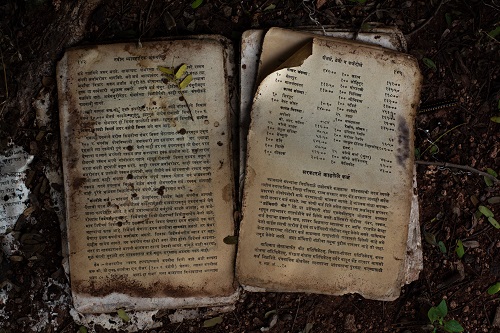Poeticism has turned into something of an insincere practice in our society. It’s as if the modern human can’t stomach anything that isn’t given to him unembellished. Few people will even deign to turn their heads at this truth, thinking it nothing more than a product of “the times.” We of the austere working class, inclined to suppress our misery through artistic debauchery, know differently. Yet, as with all things in life, knowing the truth will only lead to more suffering if you’re powerless to do anything about it.
Watching this cultural transition unfold across decades is a disconcerting experience. It seems like it was not so long ago when we would celebrate the tendency to express our thoughts in the abstract, our beliefs in verbiage, and our feelings in a vortex of words too labyrinthine to adequately understand and all too long-winded to properly remember. Now, writers have to carefully censor the poet within — the eccentric romantic just waiting for an opportunity to soar in a flurry of well-thought-out sentences, gooseflesh-inducing turns of phrase, and all sorts of clever allegories, analogies, allusions, similes, and parables — lest they startle their audience into flight, an audience that has been ever so gradually pampered to accept everything in its most stripped-down, basic form.
In fact, I know of no fewer than a dozen editors who would’ve discouraged me from writing in the way I just did above. Long sentences, untypical and unconventional word choices, and a string of thoughts that attempt to sew several different concepts together, yet remain unbowed under the weight of everything they’re trying to convey in so short a paragraph. They would’ve scoffed at the mere idea of deviating from the rulebook, the established laws that have more than paid for themselves since being adopted by the medium. They would’ve rolled their eyes and reminded me of the thousands upon thousands of best-sellers that prove you don’t need to be exceptionally crafty with the way you spin language into existence, that there’s no such thing as perfect, and that when it comes down to it, prose is subjective. Who, then, wouldn’t err on the side of caution?
They would implore me to not waste my talent, to focus my efforts on a plausible goal, to not be such a paradoxical, foolhardy perfectionist.
Suffice it to say, I don’t always listen…
I’ll admit, I don’t actually know how I’m going to approach this next part. More specifically, I don’t know how to make it make sense. It’s usually the case that our thoughts about something are orderly, especially something that we’ve given much thought to. And believe me, I’ve given a lot of thought to this matter. I’ve given it most of my life, really. It’s the futility of it that keeps me back at this moment. You see, I can try to make you understand, but I know that you won’t. I know that as powerful as words are, they are a pale shadow of the eternity of thought that stretches your conscious self across the tapestry of time.
Still, I started writing this with the intention of making a point, as elusive as that point may turn out to be when the moment arrives.
This is about writing. About what it means to make things up, turn them into words, then write those words down. Actually, no. In a way, this is about the making of things. The creative process that many artists go through to finish a chapter, a song, a sequence, a dance.
No, wait. That doesn’t seem right. I guess this is about human perception, and how it affects cognition on a most fundamental level. Or maybe it’s about the nature of logic, the study of form and style, and how they constitute a frame of reference to draw on when appraising a work of art.
And, unless I miss my guess, it could also be about the so-called muse, this powerful force from the unknown that bestows us with sweet words and sweeter tunes to weave into the perfect sonnet for our imaginary audience.
Or maybe it’s about none of these things. I already warned you. We’re in dangerous territory now. Personal territory. You’re taking a glimpse into the madness that gives me sleepless nights, the eccentricity that would’ve turned me into a rambling nutcase if not for my still-intact social inhibitors.
Still here? So be it then.
Logic dictates that there can be no such thing as perfection. Almost every school of thought can unanimously agree with that sentiment, which you’ll know is a very rare thing to come by if you’ve ever brushed up against philosophy in your life. Psychologists would say perfectionism is defeatist. Sagacious thinkers and ponderers of the mysteries of the universe would let you know the very definition of perfect is self-contradictory. I mean, where would you even begin with that definition? To claim that something is perfect, you have to prove that it is, in every facet and mote of its being, without flaw. But even before that, you’ll be juggling a bigger logical incongruity, what we’d like to call circular reasoning. You see, determining the criteria for perfection without any perfectly objective basis from the outside is utterly nonsensical, and any standard not based on the objective truth — if there even exists such a thing —would just be subject to personal interpretation. The very word “perfect” seems to imply the idea’s prerequisite to anchor itself to a set of objective values. And speaking of anchors, there is also the fallacy of the anchoring effect. In simple terms, your starting reference point for “perfect” cannot be subject to any potential change without undermining the morpheme itself. The problems continue to mount up.
All of that is just the elaborate, drawn-out way of saying “perfection” doesn’t exist. But the thing is, anyone with half a mind for these things would’ve already figured that out for themselves. You don’t need to read books and volumes on psychology or philosophy to realize that capturing “perfection” is like chasing the wind.
Yet all of us know of artists who struggle to capture it nonetheless. Because at the end of the day, it doesn’t matter what you call the practice. It doesn’t matter if it makes no sense from a logical standpoint. Logic has barely anything to do with it, for this is not an issue of logos, but a manifestation of pathos. In familiar terms, these aren’t problems of reason, but of the heart. When all is said and done, “perfect” is just a matter of semantics. Let those with a keen mind for pinning everything down with an exact definition try to figure it out. This is beyond our skill, our wit, and our wish. This is the hill we die upon with willful ignorance on our backs, the sweet savor of deliverance on our mouths, and the dream of constellations in our heads.
For if one can’t aim for perfection, one could damn well aim for something nearly indistinguishable from it. Right?
How far do we dare take this obsession for the perfect creation? Where do we draw the line and say enough is enough? How do we reconcile the thousands of contradictory pieces of information floating around in our head, compelling us to move to and fro every element until we lose all sense of objectivity? Is acclaim to be found at the bottom of whatever tankard the critics drink from? How much popularity is an indicator of success, and how far can you stretch that until it becomes the so-called opiate entertainment of the masses? Dare you be that kind of snob? And how do you tell the difference between people who truly value high art and those who are out to spout a word salad, so laden with implications and half-baked arguments, that it can only come out as unrelatable and pretentious?
And all of this in a world that doesn’t seem to care about it one way or another. In a TikTok-ified society where people, unbeknownst even to themselves, scoff at cognition and appear to ever so silently favor the simplification of all things.
You may realize this but scratches the surface of this tenuous link to sanity that some artists have to cultivate and maintain to continue to function. The auteur might at first be mistaken for a self-important, selfish hack who abuses his authority to become a creative tyrant, but you’d be mistaken to judge them based on their outwardly calm demeanor. What you interpret as confidence is merely putting up a bold front, all the while fighting the furnace of insecurity boiling in your stomach, running counterpoint to every idea you come up with, searing your soul until you feel the burden in every fiber of your being.
This is the madness that moves the musician to play the instrument for hours on end, until his fingers grow numb and his mind contracts in a blurry haze. This is the unseen force pushing the dancer to glide around the room until her feet are a mess of blisters and aching bones. This is what compels the director to go for take after take, dozens and hundreds of them, until he captures that perfect piece of the puzzle fitting the rest of his peculiar vision. And, I guess, this is what also spurred Patrick Rothfuss and fueled his insanity to work on 800 drafts of The Name of the Wind before settling for one that rang true to him in all the right ways.
If you find that hard to believe, you must not know the man. If you’re utterly dumbstruck, I sympathize with you entirely. If you’re not impressed, you simply don’t understand.
This was a recent revelation, actually. I mean, we always knew the man was obsessive with his edits, the frenzied hours spent tinkering with every word of every sentence so they might sound just right. We know that it has taken him more than a decade to rewrite an already drafted threequel, serving as the last piece of the puzzle that is The Kingkiller Chronicle. So, these tendencies aren’t exactly lost on his most enthusiastic fans.
Then again, it must be said. Three or four I might have understood, because it is only conventional. Five or six usually borders on obsessiveness. Ten is plenty, and a bit odd. But eight hundred? If you’ve ever drafted a book or a script, regardless of their length, you know that 800 is an absurd number. Ludicrous, even.
And just so he can rub your nose in it, kick you when you’re down, add insult to injury, and rub some salt in the wound while he’s at it, the entire book is apparently written in something called an iambic pentameter. If you’re not a native English speaker, you don’t know what that is. If you’re native, you still probably don’t know about it if you’ve not had a proclivity for language, poetry, and literature. But it sure explains why reading the book feels like listening to a long song. “A lot of people who think they love my characters or love my world don’t realize that the wave that they’re riding is held up by water and the water is the words,” he explains. “The boat might be the character but what is moving them is the words. And they don’t need to know. As a matter of fact, if they noticed, I probably f**ked up.”
The very conversation sends shivers down my spine, but not of the kind you get when you hear something pleasing. This is the kind that makes you scared of the career prospects you might have chosen for yourself. Scared not because of the insanity of the scale of one author’s work, but because you understand the inclination all too well.
And perhaps because you could never rightly bring yourself to criticize such an approach when the result more often than not ends up being a work of art that makes you fall in love with this strange, unfathomable twirl all over again.
Oh, the pains, the madnesses, and the torments we put ourselves through for the pursuit of this illusive, treacherous thing called excellence.
I might go on and on, but let’s cut this short and bring it to a conclusion one last time. In a lot of ways, this blog was about a book. But I guess at the same time, it was about much more than that.





You need to take part in a contest for one of the best blogs on the web. I’ll suggest this web site!